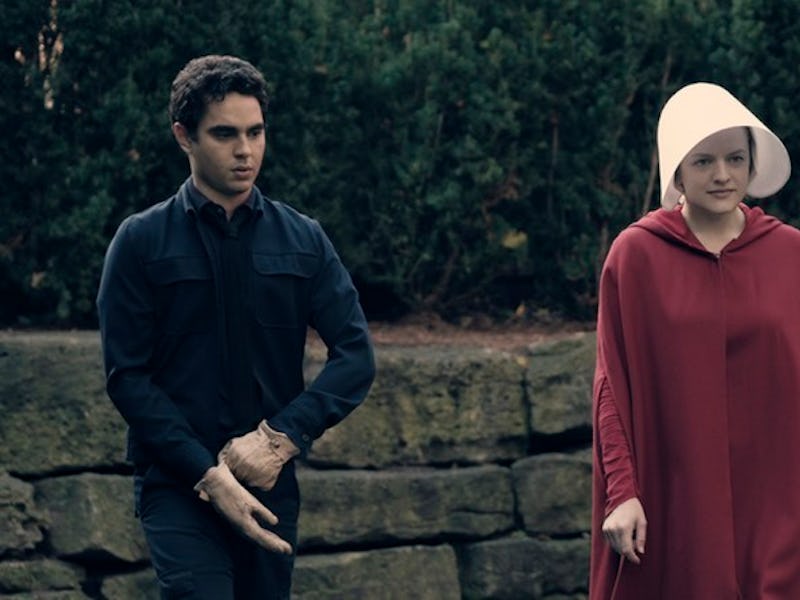Hulu's 'Handmaid's Tale' Ruins Nick's Role in Its Story
Offred finally sleeps with Nick in "Faithful," but here's where the message is off.

In the fifth episode of its first season, Hulu’s adaptation of Margaret Atwood’s The Handmaid’s Tale finally presents a sex scene that isn’t excruciatingly awkward. In it, protagonist Offred has sex with the mysterious driver Nick — and both characters actually seem to have a good time.
Unlike the ritualistic sex ceremonies that Offred undergoes with her Commander and his wife, nobody stares blankly at the ceiling or leaves their clothes on as a barrier. The scene has been a long time coming, because in previous episodes, Offred and Nick’s stilted flirting and sexual tension has given them a classic “will they or won’t they” dynamic. But that’s the problem. By making it clear that Nick is interested in Offred, the show is misunderstanding the purpose of their relationship in Atwood’s narrative.
In the dystopian world of The Handmaid’s Tale, the government polices sex, and authorities use it as weapon of subjugation. Citizens aren’t allowed to have sex unless it’s for procreation — and even then, it must only be with someone they’re assigned to. In the first episode, Offred explains in a voiceover that Nick is low status because he “hasn’t even been issued a woman.”
Elisabeth Moss as Offred and Max Minghella as Nick in 'The Handmaid's Tale'
The show, like the novel, initially presents Nick as shadowy: He might be an Eye working for the government, or he might be secretly working for the underground resistance. But that’s where the similarities end, because where the book makes his feelings for her similarly opaque, the show makes them clear. Although he’s stiff and distant like everyone in Gilead, he continuously expresses concern for Offred; warning her about who to trust, and tending to her when she’s injured.
Before long, the show even removes the ambiguity about whether he’s an Eye. In “Faithful,” before she initiates sex with him, Offred asks, “Just tell me. Please. Are you an Eye…?” He responds with “Yes.” By having Nick not only express concern for her but also be honest with her, the show is adding a level of romance to their relationship, cloaking it in the veneer of “forbidden romance in a cruel world.”
While calling their stilted interactions “romantic” might seem odd to people who have only seen the show, they’re downright saccharine compared to the book. There, it’s open to interpretation whether Nick reciprocates her infatuation or whether he’s receptive simply because he’s getting sex in a world where it’s rare. Most of their communication is nonverbal and solely sexual. The first time they sleep together, Nick says, “No romance, okay?” Later, Offred describes when she visits Nick’s room at night: “He’s always got something in his hand, as if he’s been going about his life as usual, not expecting me, not waiting. Maybe he doesn’t expect me, or wait.”
Offred and Nick in 'The Handmaid's Tale'
It isn’t a relationship or even even an affair. Instead, their sex serves a more important purpose: As Offred’s sole source of pleasure in this world that polices her sexuality, it’s an act of rebellion. Before she becomes involved with Nick, she fantasizes about how having sex with him “…would be like shouting, it would be like shooting someone.”
As Elisabeth Moss, who plays Offred, has previously said, Offred is not a revolutionary. That’s where the story’s power comes from: She’s an ordinary person whose existence has become politicized. Thus, the minor act of having sex with her tall, dark, mysterious acquaintance has become her version of a revolt.
Nick’s opaqueness is a key aspect of this revolt, because the fact that he might not have her best interests at heart adds a dimension of danger and raises the stakes. As Offred tells the reader, “I did not do it for him but for myself entirely.” Atwood even uses the language of teenage rebellion to describe him — when Offred attempts to have an honest conversation about their relationship, and Atwood describes Nick as responding with “teenage surliness.” Offred seeks Nick out like a teenager pursuing someone her parents warn her away from; only here, her “parents” are a brutal, patriarchal regime.
By distilling Offred and Nick into “forbidden romance” for television, Hulu’s The Handmaid’s Tale is losing the most important essence of it. Offred chooses to not let the bastards grind her down, and part of that choice is a rebellion in the form of an infatuation with a mysterious man who may or may not have her interests at heart. Their relationship is a fascinating study of this world’s power structure, but the show has ground it down into a sexy affair.
The Handmaid’s Tale is currently airing on Wednesdays on Hulu.